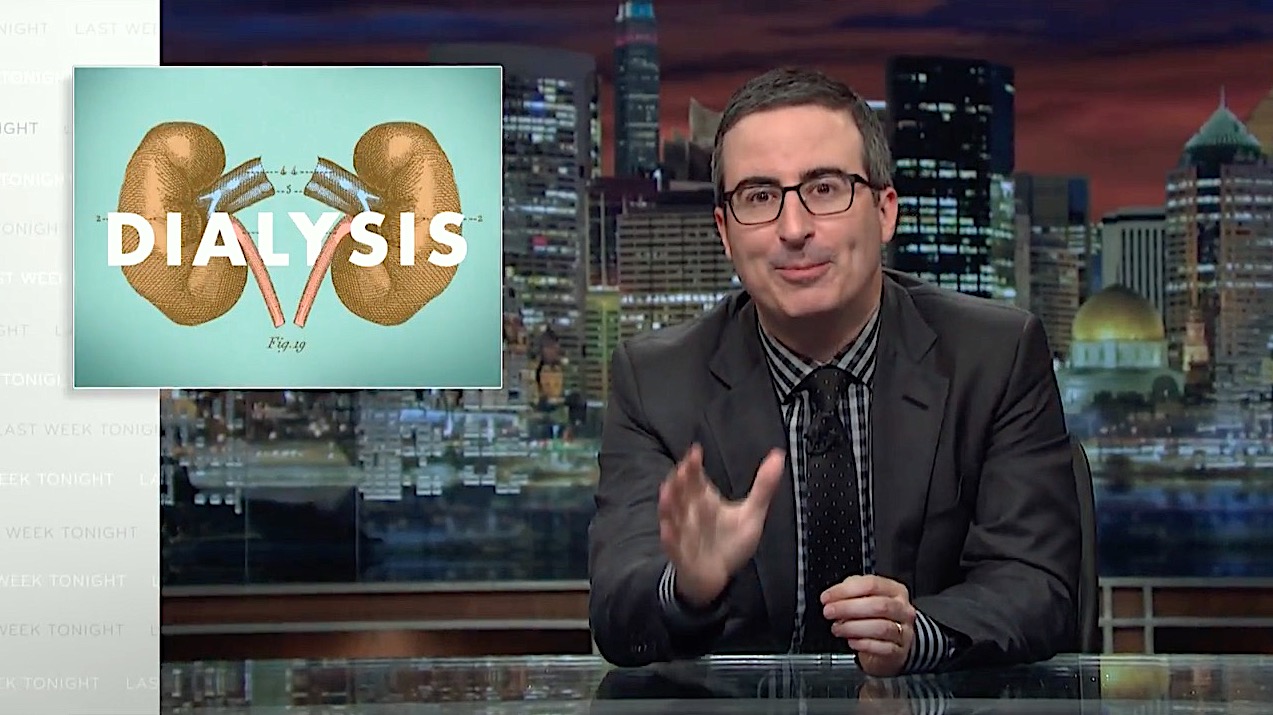John Oliver tackles kidney dialysis, Taco Bell, and what they can teach us about single-payer health care


A free daily email with the biggest news stories of the day – and the best features from TheWeek.com
You are now subscribed
Your newsletter sign-up was successful
On Sunday's Last Week Tonight, John Oliver dove headlong into the topic of kidney dialysis. Yes, he knows. "I know that right now you're getting ready to push the button on your TV remote marked 'Dear God Literally Anything Else,' but I promise you, this is worth listening to," he said. And really, it's more interesting than you probably think. He started off with a definition. "Dialysis is basically where a machine acts as your kidneys by taking blood out of your body, cleaning it, and then returning it to you," Oliver said. "Think of it as a Brita pitcher for your blood — which, yes, is more disgusting than I needed to make it sound."
Chronic kidney disease is the No. 9 cause of death in the U.S., but America pays more than its peers on dialysis care, for worse results, Oliver noted. "We're basically paying for a fully loaded Lamborghini and receiving a drunk donkey on roller skates." In 1972, Richard Nixon signed a law saying the government will pay for dialysis for anyone who needs it, "which is really incredible," he said. "Essentially, we have universal health care in this country for one organ in the body. It's like your kidneys, and only your kidneys, are Canadian."
As the cost of caring for the ballooning number of people in need of kidney dialysis has risen to about 1 percent of the federal budget, a lucrative for-profit dialysis industry has emerged, dominated by two companies. Oliver focused most of his report on the bigger one, DaVita, and its swashbuckling CEO, Kent Thiry. He ran through the alleged problems at DaVita clinics, and played a video of Thiry sort of owning up to the conveyor-belt culture. "Yes, you heard him right," Oliver said. "He just said he manages DaVita, a health-care company, like he would a Taco Bell, the exact opposite of a health-care company."
The Week
Escape your echo chamber. Get the facts behind the news, plus analysis from multiple perspectives.

Sign up for The Week's Free Newsletters
From our morning news briefing to a weekly Good News Newsletter, get the best of The Week delivered directly to your inbox.
From our morning news briefing to a weekly Good News Newsletter, get the best of The Week delivered directly to your inbox.
"Richard Nixon did a truly amazing thing," Oliver concluded. "He said we should take care of people with kidney disease, and we did it. And we should keep doing it, but we could do it a lot better. The care of America's kidneys is way too important to be treated like a fast-food experience." Which brought him back to Taco Bell, and a commercial Last Week Tonight created standing up for the fast-food chain, kind of. Watch below — be warned that there's NSFW language scattered throughout. Peter Weber

A free daily email with the biggest news stories of the day – and the best features from TheWeek.com
Peter has worked as a news and culture writer and editor at The Week since the site's launch in 2008. He covers politics, world affairs, religion and cultural currents. His journalism career began as a copy editor at a financial newswire and has included editorial positions at The New York Times Magazine, Facts on File, and Oregon State University.
-
 What is the endgame in the DHS shutdown?
What is the endgame in the DHS shutdown?Today’s Big Question Democrats want to rein in ICE’s immigration crackdown
-
 ‘Poor time management isn’t just an inconvenience’
‘Poor time management isn’t just an inconvenience’Instant Opinion Opinion, comment and editorials of the day
-
 Bad Bunny’s Super Bowl: A win for unity
Bad Bunny’s Super Bowl: A win for unityFeature The global superstar's halftime show was a celebration for everyone to enjoy
-
 TikTok secures deal to remain in US
TikTok secures deal to remain in USSpeed Read ByteDance will form a US version of the popular video-sharing platform
-
 Unemployment rate ticks up amid fall job losses
Unemployment rate ticks up amid fall job lossesSpeed Read Data released by the Commerce Department indicates ‘one of the weakest American labor markets in years’
-
 US mints final penny after 232-year run
US mints final penny after 232-year runSpeed Read Production of the one-cent coin has ended
-
 Warner Bros. explores sale amid Paramount bids
Warner Bros. explores sale amid Paramount bidsSpeed Read The media giant, home to HBO and DC Studios, has received interest from multiple buying parties
-
 Gold tops $4K per ounce, signaling financial unease
Gold tops $4K per ounce, signaling financial uneaseSpeed Read Investors are worried about President Donald Trump’s trade war
-
 Electronic Arts to go private in record $55B deal
Electronic Arts to go private in record $55B dealspeed read The video game giant is behind ‘The Sims’ and ‘Madden NFL’
-
 New York court tosses Trump's $500M fraud fine
New York court tosses Trump's $500M fraud fineSpeed Read A divided appeals court threw out a hefty penalty against President Trump for fraudulently inflating his wealth
-
 Trump said to seek government stake in Intel
Trump said to seek government stake in IntelSpeed Read The president and Intel CEO Lip-Bu Tan reportedly discussed the proposal at a recent meeting
